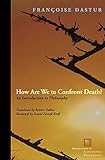How Are We to Confront Death? : An Introduction to Philosophy / Françoise Dastur.
Material type: TextSeries: Perspectives in Continental PhilosophyPublisher: New York, NY : Fordham University Press, [2022]Copyright date: ©2013Description: 1 online resource (88 p.)Content type:
TextSeries: Perspectives in Continental PhilosophyPublisher: New York, NY : Fordham University Press, [2022]Copyright date: ©2013Description: 1 online resource (88 p.)Content type: - 9780823242405
- 9780823291748
- online - DeGruyter
| Item type | Current library | Call number | URL | Status | Notes | Barcode | |
|---|---|---|---|---|---|---|---|
 eBook
eBook
|
Biblioteca "Angelicum" Pont. Univ. S.Tommaso d'Aquino Nuvola online | online - DeGruyter (Browse shelf(Opens below)) | Online access | Not for loan (Accesso limitato) | Accesso per gli utenti autorizzati / Access for authorized users | (dgr)9780823291748 |
Frontmatter -- Contents -- Foreword -- Introduction -- 1 Overcoming Death -- 2 Neutralizing Death -- 3 Accepting Death -- Notes
restricted access online access with authorization star
http://purl.org/coar/access_right/c_16ec
Confronting death means looking it squarely in the face. Contemporary society refuses to do so, preferring to hide it and hide from it. Funeral rites no longer function as a way to mediate death or to maintain a link between the living and dead. Today the disappearance of certain funerary practices attests to the denial of death as such. They reflect a preference for focusing on remembering the life of the deceased in order to neutralize death, thus displacing the value of mourning, now viewed as something to be done as quickly as possible. Moreover, science, like religion before it and like the contemporary “cult of the body,” has fed our fantasies about immortality, promising us longer lives of better quality, and even the possibility of conquering death altogether. Despite all these attempts to overcome or neutralize death, humanity has been unable to eliminate its anxiety about death and nothingness. True to her roots in phenomenology, Dastur not only examines these contemporary tendencies with a critical eye but also argues that we must once again learn to assume death, to become mortal, to learn how to die. Death is not the last moment of human life, but rather its essential attribute. Dastur’s skill as a “translator” of phenomenology into accessible and clear prose is nowhere more apparent than in her “little book on death”—indeed, the intended audience is less those who specialize in phenomenology or academic philosophy than a nonspecialist public hungry for philosophical reflection on what is closest to us. And nothing is closer to us than the ever-present possibility of our own imminent death. As its subtitle suggests, this book is an “introduction to philosophy,” one that obliges the reader to ask what it means to be human and to embrace death and mortality as the defining essence of our humanity.
Mode of access: Internet via World Wide Web.
In English.
Description based on online resource; title from PDF title page (publisher's Web site, viewed 03. Jan 2023)


